- Home
- Charlaine Harris
Dead Ever After: A Sookie Stackhouse Novel Page 3
Dead Ever After: A Sookie Stackhouse Novel Read online
Page 3
“Who are you?” she asked, standing her ground, though she knew the sun was mercilessly showing every line in her face and every deficiency in the cheap hair dye she’d applied in the jail bathroom.
“Don’t you recognize me? We met at the hearing.” The medium man’s voice was almost gentle. He took off his dark glasses, and a chime of recognition sounded in her brain.
“You’re the lawyer, the one that got me out,” she said, smiling. “I don’t know why you did that, but I owe you. I sure didn’t need to be in jail. I want to see my children.”
“And you will,” he said. “Please, please.” He opened the rear door of the car and gestured for her to get in. “I’m sorry. I should have addressed you as Mrs. Fowler.”
She was glad to climb inside, grateful to sink back onto the cushioned seat, delighted to revel in the cold air. This was the most physical comfort she’d had in many months. You didn’t appreciate soft seats and courtesy (or good mattresses and thick towels) until you didn’t have them.
“I been Mrs. a few times. And I been Miss, too,” she said. “I don’t care what you call me. This is a great car.”
“I’m glad you like it,” said the driver, a tall man with graying hair clipped very short. He turned to look over the seat at the red-haired woman, and he smiled at her. He took off his own dark glasses.
“Oh my God,” she said, in an entirely different tone. “It’s you! Really! In the flesh. I thought you was in jail. But you’re here.” She was both awed and confused.
“Yes, Sister,” he said. “I understand what a devoted follower you were and how you proved your worth. And now I’ve said thank you by getting you out of jail, where you in no way deserved to be.”
She looked away. In her heart, she knew her sins and crimes. But it was balm to her self-regard to hear that such an esteemed man—someone she’d seen on television!—thought she was a good woman. “So that’s why you put up all that money for my bail? That was a hell of a lot of cash, mister. More money than I’d ever earn in my life.”
“I want to be as staunch an advocate for you as you were for me,” the tall man said smoothly. “Besides, we know you’re not going to run.” He smiled at her, and Arlene thought about how fortunate she was. That someone would put up over a hundred thousand dollars for her bail seemed incredible. In fact, suspicious. But, Arlene figured, so far so good.
“We’re taking you home to Bon Temps,” said the medium man. “You can see your children, little Lisa and little Coby.”
The way he said her kids’ names made her feel uneasy. “They ain’t so little anymore,” she said, to drown out that flicker of doubt. “But I sure as he . . . sure want to lay eyes on them. I missed them every day I was inside.”
“In return, there are a few little things we want you to do for us, if you will,” the medium man said. There was definitely a slight foreign cadence to his English.
Arlene Fowler knew instinctively that those few things would not really be little, and definitely not optional. Looking at the two men, she didn’t sense they were interested in something she might not have minded giving up, like her body. They didn’t want her to iron their sheets or polish their silver, either. She felt more comfortable now that the cards were spread out on the table and about to be flipped over. “Uh-huh,” she said. “Like what?”
“I really don’t think you’ll mind when you hear,” said the driver. “I truly don’t.”
“All you have to do,” said the medium man, “is have a conversation with Sookie Stackhouse.”
There was a long silence. Arlene Fowler looked back and forth at the two men, measuring and calculating. “You going to get me put back in jail if I won’t?” she said.
“Since we got you out on bail pending your trial, I guess we could make that happen,” said the tall driver mildly. “But I would certainly hate to do that. Wouldn’t you?” he asked his companion.
The medium man shook his head from side to side. “That would be a great pity. The little children would be so sad. Are you afraid of Miss Stackhouse?”
There was silence while Arlene Fowler wrestled with the truth. “I’m the last person in the world Sookie’d want to see,” she hedged. “She blames me for that whole day, the day . . .” Her voice trailed off.
“The day all those people got shot,” the medium man said pleasantly. “Including you. But I know her slightly, and I think she’ll let you have a conversation. We will tell you what to say. Don’t worry about her talent. I think all will be well in that regard.”
“Her talent? You mean her mind-reading? Some talent!” Arlene, surprisingly, laughed. “That’s been the curse of her life.”
The two men smiled, and the effect was not pleasant at all. “Yes,” agreed the driver. “That has been a curse for her, and I imagine that feeling will get worse.”
“What do you want with Sookie, anyway?” Arlene asked. “She ain’t got nothing but that old house.”
“She’s caused us, and a few other people, a great deal of trouble,” said the driver. “Let’s just say she’s got some trouble coming.”
Chapter 2
The night of my second day of solitude, I faced the fact that I had to go to see Eric. Sure, he really should have visited me. He’d been the one to skedaddle when I’d raised Sam from the dead, because (I figured) he was sure it meant I loved Sam more than I loved him. But I would go to Shreveport, and we would talk, because Eric’s silence was painful to me. I watched some of the fireworks go up in the city park—today was the Fourth of July—but then I went inside to dress. I was giving in to my impulse. I was going to Fangtasia.
I wanted to look as good as I could, but I didn’t want to overdo it. I didn’t know who I’d be seeing, though I wanted to talk to Eric by himself.
I hadn’t heard from any of the vampires I knew who frequented Fangtasia. I didn’t know if Felipe de Castro, King of Arkansas, Louisiana, and Nevada, was still in Shreveport, meddling in Eric’s affairs, making Eric’s life difficult. Felipe had brought his girlfriend, Angie, and his second-in-command, Horst, with him, just to compound Eric’s vexation. Felipe was treacherous and wily, and his little entourage was much of a kind with their leader.
I also didn’t know if Freyda, Queen of Oklahoma, was still in town. Eric’s maker, Appius Livius Ocella, had signed a contract with Freyda that (to my mind) basically sold Eric into slavery with Freyda, but in a really cushy way: as her consort, with all the benefits you might imagine would pertain to such a job. Only thing was, Appius hadn’t checked with Eric first. Eric was torn, to put it mildly. Leaving his job as sheriff was not something he’d ever planned to do. If ever there was a vampire who enjoyed being a big fish in a small pond, that vampire was Eric. He’d always been a hard worker, and he’d made plenty of money for the ruler of Louisiana, whoever that happened to be. Since the vampires had come out of the coffin, he’d done much more than make money. Tall, handsome, articulate, dynamic, Eric was a great poster boy for mainstreaming vampires. And he’d even married a human: me. Though not in a human ritual.
Of course, he had his darker side. He was a vampire, after all.
All the way to Shreveport from Bon Temps, I wondered for the fiftieth time if I was making a huge mistake. By the time I’d pulled up to the back door of Fangtasia, I was so tense I was shaking. I’d put on my favorite pink dotted sundress, and I yanked the halter into place and took a few deep breaths before I knocked. The door swung open. Pam was leaning against the wall in the hallway, her arms crossed on her chest, looking broody.
“Pam,” I said, by way of greeting.
“You shouldn’t be here,” she said.
Granted, I knew that her first allegiance was to Eric, and it always would be. Nonetheless, I’d thought Pam liked me a bit, as much as she ever would a human, and her words smarted like a slap in the face. I didn’t need to hurt any worse than I already did, but I’d come here to see if I could smooth things over with Eric a little, tell him that he was wrong about Sam and me, f
ind out what he’d decided about Freyda.
“I need to talk to Eric,” I said. I didn’t try to enter. I knew better.
At that moment, the door to Eric’s office flew open. He stood framed in the doorway. Eric was big and golden and all male, and normally when he saw me, he started smiling.
Not tonight.
“Sookie, I can’t talk to you now,” he said. “Horst will be here any second, and he doesn’t need to be reminded you exist. They’ve called in a lawyer to go over the contract.”
It was like he was talking to a stranger, and furthermore, a stranger who had very little business appearing on his doorstep. In fact, Eric seemed both angry and wounded.
I had a mouthful—and heart full—of things I wanted to say. More than almost anything else in the world, I wanted to put my arms around him and tell him how much he meant to me. But as I took a half step in his direction, Eric moved back and shut the office door.
I froze for a moment, trying to absorb the shock and hurt, and keep my face from crumpling. Pam glided toward me and put one hand on my shoulder to spin me around and guide me away from the door. After it clanged shut behind us, she said into my ear, “Don’t come here again. It’s too dangerous. There’s too much going on, too many visitors.” And then she raised her voice and said, “And don’t come back until he calls you!” She gave me a little shove that propelled me into the side of my car. And then she zipped back inside and closed the door with that quick vampiric movement that always seemed like magic, or a really good video game.
So I went home, brooding over Pam’s warning and Eric’s words and demeanor. I thought about crying but didn’t have the energy. I was too tired of being sad to make myself even sadder. Obviously, there was a lot of upheaval at Fangtasia and a lot of things hanging in the balance. There was nothing I could do about it except stay out of the way in the hope that I’d live through the change in regime, whatever that turned out to be. It was like waiting for the Titanic to sink.
Another morning went by, another day I passed holding my emotional breath, waiting for something to happen . . . something conclusive, or terrible.
I didn’t feel as though I were waiting for the other shoe to drop; I felt as though I were waiting for an anvil to fall on my head. If I hadn’t met with such a crushing reception when I went to Fangtasia, I might have tried to shake things up on my own, but I was discouraged, to put it in the mildest possible way. I took a very long, hot walk through the woods to put a basket of tomatoes on the Prescotts’ back porch. I mowed my meadowlike lawn. I found I always felt better when I was outside: more whole, somehow. (And that was good, because there was a shitload of yard work to do.) But I brought my cell phone with me every step I took.
I waited for Sam to call me. But he didn’t. Neither did Bernie.
I thought Bill might come over to let me know what was going on. He didn’t.
And so ended another day of noncommunication.
The next day, when I got up, I had a message of sorts from Eric. He had texted me—texted me!—and not even personally, but through Pam. She relayed a stiff message, informing me that he’d talk to me later in the week. I had cherished a hope that perhaps Pam herself would show up to bawl me out or to enlighten me about how Eric was faring . . . but no.
As I sat on the front porch with a glass of iced tea, I examined myself to see if my heart was broken. I was so emotionally exhausted, I couldn’t tell. As I saw it, maybe melodramatically, Eric and I were struggling with the chains of the love that had bound us together, and it didn’t seem we could either break free of those chains or resume them.
I had a dozen questions and conjectures, and I dreaded the answers to all of them. Finally, I got out the weed whacker, my least favorite yard tool.
My gran used to say, “You pays your money, and you takes your choice.” I didn’t know where the saying had originated, but now I understood what it meant.
“Of course,” I said out loud, because the radio was playing and I couldn’t hear myself think over it, “if you make a decision, you have to abide by the consequences.” I hadn’t even made a conscious decision to use the cluviel dor to save Sam; I’d acted instinctively when I saw him die.
Finally, I’d reached my saturation limit on this retroactive second-guessing. I threw down the weed whacker and screamed out loud. Screw all this brooding.
I was sick of thinking about it.
So I was delighted, after I’d put away all the yard tools and showered, to hear a car crunching up my gravel driveway. I recognized Tara’s minivan. As she drove past the kitchen window, I peered out to see if the twins were strapped into their car seats, but the windows were tinted too dark. (Seeing Tara in a minivan was still a shock, but during Tara’s pregnancy she and JB had vowed to be model parents, and part of that picture was a minivan.) Tara’s shoulders were rigid as she walked to the door, but at least she was coming to the back door as friends should. She didn’t fool with knocking. She opened the back door onto the laundry room/porch and yelled, “Sookie! You better be here! Are you decent?”
“I’m here,” I said, turning to face her as she came into the kitchen. Tara was wearing some stretchy brown pants and a loose white blouse, her dark hair in a braid down her back. Her makeup was minimal. She was lovely as always, yet I couldn’t help but notice she’d let her eyebrows stray all over. Motherhood could sure wreak havoc on a woman’s grooming. Of course, having two at one time would make “me time” extra hard to come by. “Where are the babies?” I asked.
“JB’s mom’s got ’em,” she said. “She was drooling at the chance to keep ’em for a few hours.”
“So . . . ?”
“How come you’re not going to work? How come you’re not answering your e-mail or picking up your mail at the end of the driveway?” She tossed a bundle of envelopes of all sizes and a magazine or two onto the kitchen table. She glared at me as she continued, “You know how nervous that makes people? People like me?”
I was a little embarrassed at the chunk of truth in her accusation that I’d been selfish in staying out of touch while I’d been trying to understand myself and figure out my life and my future. “Excuse me,” I said sharply. “I did call in sick to work, and I’m surprised you want to risk taking my germs back to the babies!”
“You look fine to me,” she said, without a speck of sympathy. “What happened to you and Sam?”
“He’s all right, isn’t he?” My anger faltered and disappeared.
“He’s had Kennedy working in his place for days. He talks to her by phone. He doesn’t come over to the bar.” She was still glaring at me, but her stance was softening. I could tell from her thoughts that she was genuinely concerned. “Kennedy’s real happy to do extra bartending, since she and Danny are saving up to rent a house together. But that business can’t run itself, Sookie, and Sam hasn’t missed four days at the bar, if he was in Bon Temps, since he bought the place.”
That last part was mostly a muted blahblahblah. Sam was all right.
I sat in one of the kitchen chairs a little too hastily.
“Okay, tell me what happened,” Tara said, and sat opposite me. “I wasn’t sure I wanted to know. But I guess now you better tell me.”
I did want to talk to someone about what had happened at Alcide Herveaux’s country place. But I couldn’t tell Tara the whole story: the captive rogue Weres, Jannalynn’s betrayal of her pack and her leader, the horrible things she’d done. I couldn’t imagine how Sam was feeling. Not only had he learned the true nature of his girlfriend—though evidence suggested that he’d always suspected Jannalynn was playing a deeper game—but he had to absorb her death, which had been truly gruesome. Jannalynn had been trying to kill Alcide, her packleader, but she’d given Sam a mortal wound instead. Then Mustapha Khan had executed her.
I opened my mouth to try to begin the story, and found I didn’t know where to start. I looked at my friends-since-childhood buddy helplessly. She waited, with a look that said she intended
to sit right there in my kitchen until I answered her. Finally, I said, “The gist of it is that Jannalynn is now completely and permanently out of the picture, and I saved Sam’s life. Eric feels that I should have done something for him, instead. Something significant, that I was aware of.” I left off the punch line.
“So Jannalynn hasn’t gone to Alaska to visit her cousin.” Tara was compressing her lips to keep from looking as freaked as she felt. But there was a hint of triumph, too. She was thinking she had known something was fishy about that story.
“Not unless Alaska has gotten a lot hotter.”
Tara giggled; but then, she hadn’t been there. “She did something that bad? I read in the paper that someone had confessed over the telephone to the officer in charge of Kym Rowe’s murder and then vanished. Would that be Jannalynn, by any chance?”
I nodded. Tara didn’t seem shocked. Tara knew all about people who did bad things. Two of them had been her parents.
“So you haven’t talked to Sam since then,” she said.
“Not since the next morning.” I hoped Tara would say she’d seen him, talked to him, but instead she moved on to a topic she considered more interesting.
“What about the Viking? Why is he pissed? His life didn’t need saving. He’s already dead.”
I held my hands palms up and open, trying to think how to phrase it. Well, I might as well be honest, if not graphic. “It’s like . . . I had a magic wish. I could have used it for Eric’s benefit, to get him out of a bad situation. And it would have changed his future. But instead, I used it to save Sam.” And then I’d waited for the repercussions. Because using strong magic always had consequences.
Tara, who had had bad experiences with vampires, smiled broadly. Though Eric had saved her life once upon a time, she included him in her generic dislike of the undead. “Did a genie grant you three wishes or something?” she said, trying to keep the pleasure out of her voice.

 Dead Ever After
Dead Ever After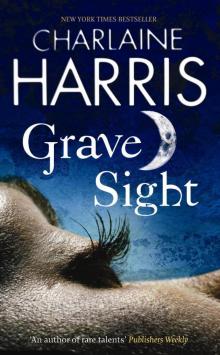 Grave Sight
Grave Sight Dead Until Dark
Dead Until Dark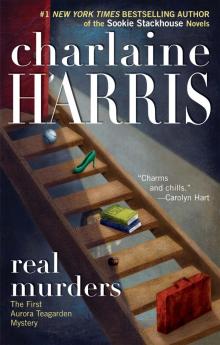 Real Murders
Real Murders Wolfsbane and Mistletoe
Wolfsbane and Mistletoe All the Little Liars
All the Little Liars Dead to the World
Dead to the World Club Dead
Club Dead Dead in the Family
Dead in the Family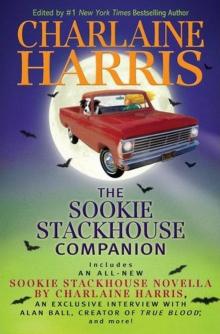 The Sookie Stackhouse Companion
The Sookie Stackhouse Companion All Together Dead
All Together Dead Dead as a Doornail
Dead as a Doornail Sleep Like a Baby
Sleep Like a Baby Night Shift
Night Shift A Touch of Dead
A Touch of Dead Living Dead in Dallas
Living Dead in Dallas Dead Reckoning
Dead Reckoning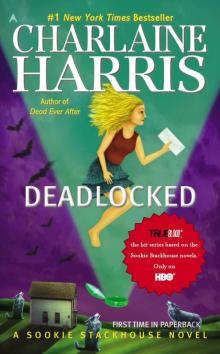 Deadlocked
Deadlocked Dead and Gone
Dead and Gone From Dead to Worse
From Dead to Worse Definitely Dead
Definitely Dead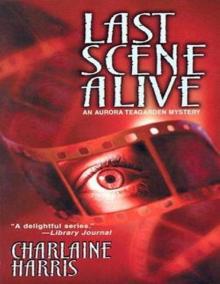 Last Scene Alive
Last Scene Alive Grave Secret
Grave Secret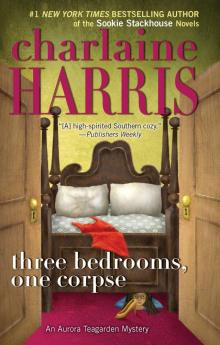 Three Bedrooms, One Corpse
Three Bedrooms, One Corpse The Russian Cage
The Russian Cage Shakespeares Counselor
Shakespeares Counselor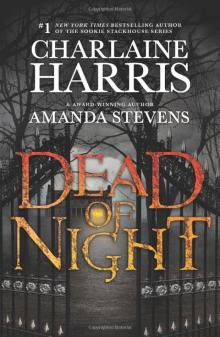 Dead of Night
Dead of Night Shakespeares Trollop
Shakespeares Trollop One Word Answer
One Word Answer Shakespeares Champion
Shakespeares Champion Shakespeares Christmas
Shakespeares Christmas Shakespeares Landlord
Shakespeares Landlord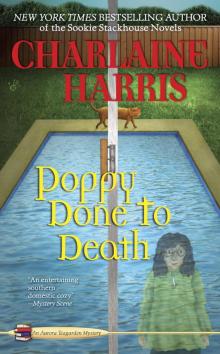 Poppy Done to Death
Poppy Done to Death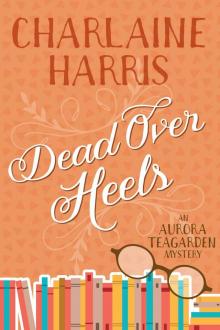 Dead Over Heels
Dead Over Heels An Ice Cold Grave
An Ice Cold Grave The Julius House
The Julius House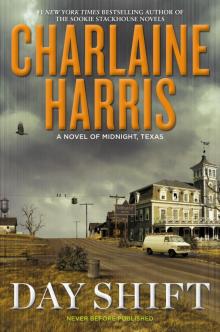 Day Shift
Day Shift A Fool And His Honey
A Fool And His Honey A Longer Fall (Gunnie Rose)
A Longer Fall (Gunnie Rose) The Complete Sookie Stackhouse Stories (Sookie Stackhouse/True Blood)
The Complete Sookie Stackhouse Stories (Sookie Stackhouse/True Blood)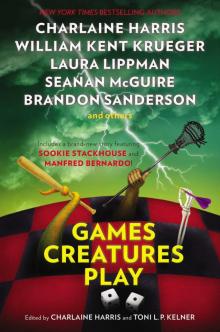 Games Creatures Play
Games Creatures Play Death's Excellent Vacation
Death's Excellent Vacation (LB2) Shakespeare's Landlord
(LB2) Shakespeare's Landlord Dancers In The Dark - Night's Edge
Dancers In The Dark - Night's Edge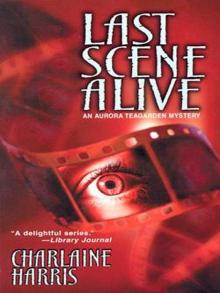 Last Scene Alive at-7
Last Scene Alive at-7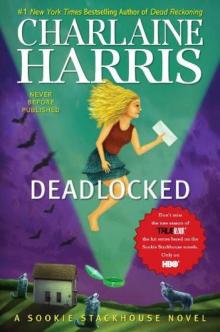 Deadlocked: A Sookie Stackhouse Novel
Deadlocked: A Sookie Stackhouse Novel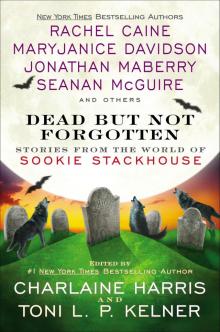 Dead But Not Forgotten
Dead But Not Forgotten (4/10) The Julius House
(4/10) The Julius House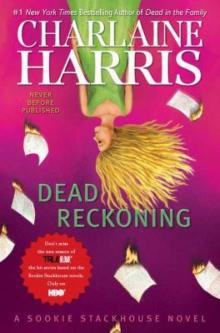 Dead Reckoning: A Sookie Stackhouse Novel
Dead Reckoning: A Sookie Stackhouse Novel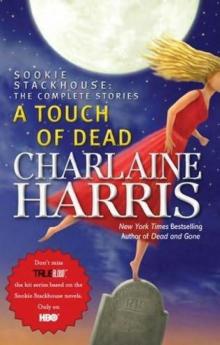 A Touch of Dead (sookie stackhouse (southern vampire))
A Touch of Dead (sookie stackhouse (southern vampire))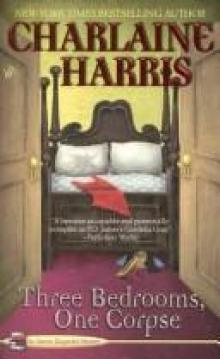 (3T)Three Bedrooms, One Corpse
(3T)Three Bedrooms, One Corpse An Easy Death
An Easy Death A Secret Rage
A Secret Rage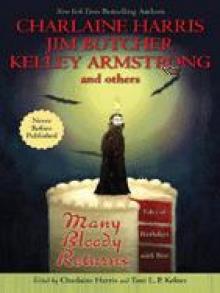 Many Bloody Returns
Many Bloody Returns![Harper Connelly [3] An Ice Cold Grave Read online](http://i1.bookreadfree.com/i/03/25/harper_connelly_3_an_ice_cold_grave_preview.jpg) Harper Connelly [3] An Ice Cold Grave
Harper Connelly [3] An Ice Cold Grave Dancers in the Dark and Layla Steps Up
Dancers in the Dark and Layla Steps Up Small Kingdoms and Other Stories
Small Kingdoms and Other Stories Dead Ever After: A Sookie Stackhouse Novel
Dead Ever After: A Sookie Stackhouse Novel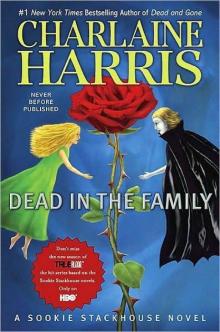 Dead in the Family ss-10
Dead in the Family ss-10 Sweet and Deadly aka Dead Dog
Sweet and Deadly aka Dead Dog An Easy Death (Gunnie Rose #1)
An Easy Death (Gunnie Rose #1) The Complete Sookie Stackhouse Stories
The Complete Sookie Stackhouse Stories Sookie Stackhouse 8-copy Boxed Set
Sookie Stackhouse 8-copy Boxed Set Sweet and Deadly
Sweet and Deadly Crimes by Moonlight
Crimes by Moonlight Dead Ever After: A True Blood Novel
Dead Ever After: A True Blood Novel Dead Ever After ss-13
Dead Ever After ss-13 After Dead
After Dead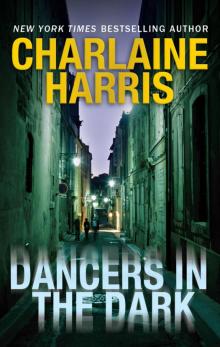 Dancers in the Dark
Dancers in the Dark (LB1) Shakespeare's Champion
(LB1) Shakespeare's Champion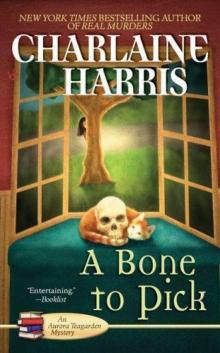 A Bone to Pick (Teagarden Mysteries,2)
A Bone to Pick (Teagarden Mysteries,2)